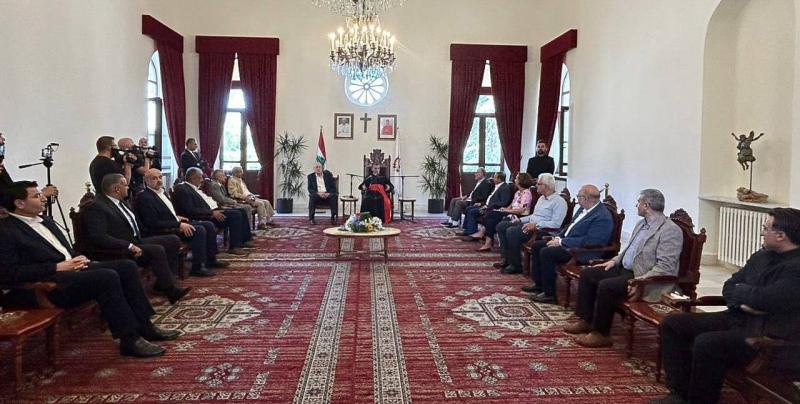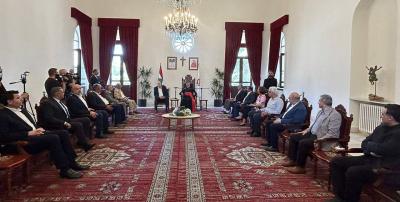The ministerial consultative meeting held at the Maronite Patriarchal See in Dima, chaired by Prime Minister Najib Mikati and attended by Maronite Patriarch Bechara Rai, emphasized the "urgent need to elect a president for the republic who can lead the rescue and recovery process, as there is no possibility of organized work in the absence of a head of state." The statement stressed the importance of the political forces' commitment to the Taif Agreement and the charter of coexistence, urging the abandonment of any actions that may undermine the unique Lebanese formula.
Regarding the Syrian displacement, the statement highlighted the "need for sincere cooperation among all Lebanese components to formulate a unified stance on the Syrian displacement crisis in Lebanon and to collaborate with the Syrian state and the international community to address this issue in a way that preserves Lebanon's unity and identity." Citizens were called to engage in a "continuous dialogue of life among themselves, ensuring that each citizen reassures their fellow compatriot of their thoughts, presence, rights, and effective national belonging."
The statement pointed out that "Lebanon is going through one of the most dangerous phases in its history, filled with political, economic, financial, and living crises that are clear to all, alongside another existential crisis concerning its essence and civilizational role in humanity as a whole." It called on "all authorities, educational and media institutions, and active civil society forces, along with the Lebanese people across all affiliations, to cling to the national identity and its public ethics and values passed down from generation to generation, especially the value of family and its protection, and to confront ideas that contradict the Creator's order and the principles that unite the Lebanese."
Additionally, it stated: "Lebanese citizens are invited to safeguard this formula by reinforcing their belonging to our inclusive national identity and working to strengthen unity through diversity, while abandoning calls to disassociate from one another, regardless of their labels." It pointed out that "in these days, we are faced, at both official and unofficial levels, with a discourse masked by the advocacy of modernity, freedom, and human rights, which contradicts the religious and moral values intrinsic to our psychological, spiritual, and social formation. This discourse is a blatant violation of the text and spirit of Articles 9 and 10 of the Lebanese Constitution. The responsibility to confront this discourse falls on everyone's shoulders without exception, including religious authorities, political and judicial powers, educational and media institutions, and civil society forces, because we refuse to have our children's present muddled, risking a distorted future for them."
At the beginning of the meeting, Patriarch Rai welcomed the Prime Minister and ministers, stating, "The idea of this meeting emerged spontaneously; it is not a Cabinet session but a spontaneous gathering to discuss all public issues. Dima has always been a gathering place for a common word; I regret that some have burdened this meeting beyond what it can bear." He clarified that "when French presidential envoy Jean-Yves Le Drian visited me for the first time, I told him that everything he hears does not reflect the truth. We are a democratic parliamentary republic, and there are two presidential candidates; it is the MPs' duty to vote, either elect a president or not, and based on the result, a dialogue and agreement on a third candidate can occur. Unfortunately, the country is heading toward ruin and the state is struggling, and the ongoing debates regarding the government's right to operate and the limits of that are the result of these circumstances."
Patriarch Rai added, "Our meeting today is free and fraternal to discuss everything clearly, and what needs to be said will be said. We are pleased today, Mr. President, with your presence alongside the ministers."
Prime Minister Mikati then spoke, saying, "It is difficult to add any word to what His Eminence has said. The idea for this meeting was conceived at the time we gathered last week, agreeing on this meeting to discuss issues that unite the Lebanese, foremost among them respecting the Lebanese formula and the diversity within the Lebanese unity that we consider Lebanon's treasure. There is a consensus among all Lebanese to adhere to the Lebanese spiritual and ethical values and the family. From this standpoint, we desired to hold this meeting, and we wonder at some interpretations given to it, stating that it constitutes a coup against the Taif Agreement, knowing that the spirit of the Taif Agreement calls for dialogue and meeting among the Lebanese."
Mikati continued, "We are ready to be a bridge between all Lebanese and to engage in dialogue on all topics that unite them. If we cannot move, even within the framework of dialogue and meeting, the country will not recover. The country is without a president and governed by a caretaker government, the Parliament is not convening, and political bickering has reached its peak. We are willing to meet anywhere to be a bridge of dialogue and brotherhood among all Lebanese."
He added, "Our discussions will address the Lebanese formula, commitment to it, and the ethical and spiritual values rooted in the family. We thank you, Your Eminence, for your hospitality, and we regret that some were unable to attend for various reasons."
Minister of Information Ziad Al-Makari, upon his arrival in Dima, noted that "the country is greater than everyone," considering that "the blessing of Maronite Patriarch Bechara Rai is fundamental for Christian support," and that "the symbolism of the meeting in Dima is paramount." Reports suggested that there might be a lunch following the consultative meeting, as well as a possible tour for the ministers in the Qannoubin Valley.
Notably, the attending ministers included: Bassam Mawlawi, Firas Al-Abyad, Abbas Halabi, Georges Kallas, Youssef Khalil, Georges Boujikian, Mohammad Wissam Murtada, Abbas Al-Haj Hassan, Issam Sharafeddine, Najla Riachi, George Karam, Ziad Al-Makari, Ali Hamie, Amin Salam, and Mustafa Bayram.




